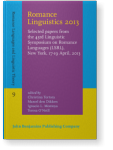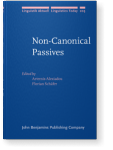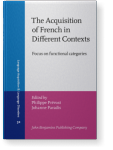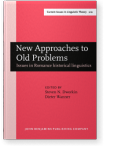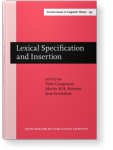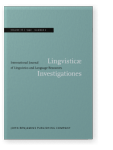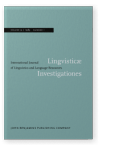Marie Labelle
List of John Benjamins publications for which Marie Labelle plays a role.
2016 Participle fronting and clause structure in Old and Middle French Romance Linguistics 2013: Selected papers from the 43rd Linguistic Symposium on Romance Languages (LSRL), New York, 17-19 April, 2013, Tortora, Christina, Marcel den Dikken, Ignacio L. Montoya and Teresa O'Neill (eds.), pp. 213–232 | Article
This paper is a study of over 1100 Old and Middle French sentences in which a participle has been fronted to the left of an auxiliary, in what appears at first sight to be a Stylistic Fronting construction. These sentences were extracted from the MCVF parsed corpus of Old and Middle French. The… read more
2013 Anticausativizing a causative verb: The passive se faire construction in French Non-Canonical Passives, Alexiadou, Artemis and Florian Schäfer (eds.), pp. 235–260 | Article
2011 An ergative analysis of French valency alternations Romance Linguistics 2010: Selected papers from the 40th Linguistic Symposium on Romance Languages (LSRL), Seattle, Washington, March 2010, Herschensohn, Julia (ed.), pp. 137–154 | Article
The French anticausative is attested in two separate constructions: one focuses on the result (Res-AC), e.g. Le rameau s’est flétri; the second focuses on the process (Proc-AC) – Le rameau a flétri, both translated to English as ‘The branch withered’. The paper proposes to explain the differences… read more
2008 Pronominal object markers in Romance and Bantu The Bantu–Romance Connection: A comparative investigation of verbal agreement, DPs, and information structure, De Cat, Cécile and Katherine Demuth (eds.), pp. 83–109 | Article
Romance pronominal clitics and Bantu object markers vary in gender and number, replace arguments, and surface to the left of the verbal root in declarative clauses. Both types of morphemes are regularly analyzed as affixes on the verb. It is argued that both have syntactic properties that justify… read more
2006 Proclisis and Enclisis of Object Pronouns at the Turn of the 17th Century: The Speech of the Future Louis XIIIth Historical Romance Linguistics: Retrospective and perspectives, Gess, Randall and Deborah Arteaga (eds.), pp. 187–208 | Article
2004 Functional categories and the acquisition of distance quantification The Acquisition of French in Different Contexts: Focus on functional categories, Prévost, Philippe and Johanne Paradis (eds.), pp. 27–49 | Chapter
2003 Residual Tobler-Mussafia in French Dialects Romance Linguistics: Theory and Acquisition, Pérez-Leroux, Ana Teresa and Yves Roberge (eds.), pp. 149–164 | Article
2003 Events, States and the French Imparfait Romance Linguistics: Theory and Acquisition, Pérez-Leroux, Ana Teresa and Yves Roberge (eds.), pp. 165–180 | Article
2003 The Left Periphery in Child French: Evidence for a Simply-Split CP Romance Languages and Linguistic Theory 2001: Selected papers from 'Going Romance', Amsterdam, 6–8 December 2001, Quer, Josep, Jan Schroten, Mauro Scorretti, Petra Sleeman and Els Verheugd-Daatzelaar (eds.), pp. 279–294 | Article
2000 Evolving Tobler-Mussafia Effects in the Placements of French Clitics New Approaches to Old Problems: Issues in Romance historical linguistics, Dworkin, Steven N. and Dieter Wanner (eds.), pp. 165–182 | Chapter
2000 The Semantic Representation of Denominal Verbs Lexical Specification and Insertion, Coopmans, Peter, Martin B.H. Everaert and Jane Grimshaw (eds.), pp. 215–240 | Article
1992 La Structure Argumentale des Verbes Locatifs a Base Nominale Lingvisticæ Investigationes 16:2, pp. 267–315 | Article
This paper presents an analysis of a subclass of denominal verbs in French, more specifically those which are interpreted as involving an entity which is located with respect to a location. It is shown that (1) when the N on which the verb is formed is a descriptor for a displaced entity, the… read more
1985 Caractère Post-Lexical de la Cliticisation Française Lingvisticæ Investigationes 9:1, pp. 83–96 | Article
Recent analyses of French cliticization (Borer 1981, Aoun 1981, Jaeggli 1981 ) treat object clitic pronouns as lexical affixes. In each case, the clitic is an argument of the verb, generated by a morphological rule which inserts the features PERSON, GENDER, NUMBER, on the verb. The clitic absorbs… read more
